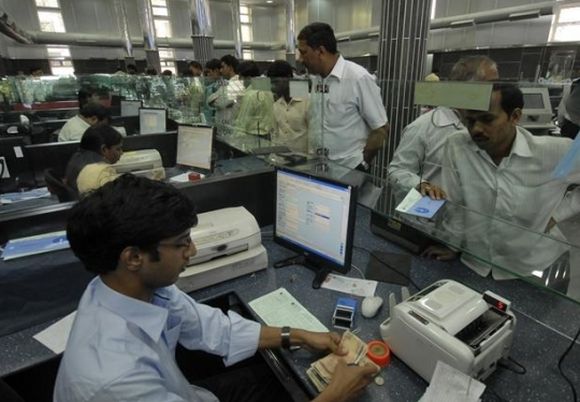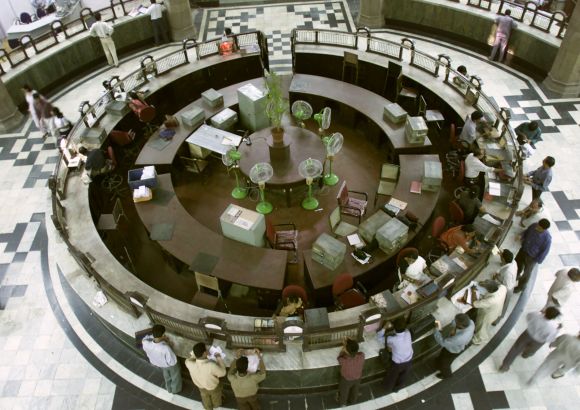Photographs: Reuters Business Standard in New Delhi
The institution may have a ubiquitous reach across the country but it lacks the required experience in the financial sector. And, it does not have an expertise in lending either.
The biggest surprise in the list of 26 applicants for a new banking licence is perhaps also the best-known entity on the list: India Post.
Yes, that's right; the post office, once ubiquitous across the country, and still familiar in India's vast rural hinterland, even though the power of its brand has decreased in the towns, is one of the contenders to set up a new bank.
If it does so, and the bank it is promoting succeeds, it will be a surprising occasion in which a government department successfully reinvents itself for the 21st century.
This will not be easy. For one thing, the Reserve Bank of India may not hand out licences to more than four or five of the applicants; and the post office's 25 rivals include the financial wings of heavyweight conglomerates like the Tatas and the Aditya Birla Group, corporate houses that have a demonstrated ability to get things done in India.
…
Can India Post survive if it gets a bank license?
Photographs: Reuters
Many of its other rivals also have demonstrated experience in the financial sector - and without the negatives associated with cross-ownership of companies.
India Post, while it has long acted as an agent for small savers to lend to the government, has no real expertise in lending elsewhere.
In addition, there are major procedural hassles to be overcome. After all, the Department of Posts is a government department, not a company, and definitely not in the private sector. It will somehow have to set up a holding company in order to get the licence.
However, the post office has great advantages: its reach, and its reputation. There are over 150,000 post offices across India, in every nook and cranny of this vast country.
…
Can India Post survive if it gets a bank license?
Image: Postal employees dispense stamps at Bombay's General Post Office.Photographs: Reuters
Rural areas aren't a problem; 90 per cent of those post offices are in India's villages. And residents of those villages are already familiar with the process of handing over money and receiving it from post-office employees, thanks to post-office deposits and money orders.
Indeed, elsewhere in the world - Germany is an oft-cited example - national mail carriers have diversified effectively into banking and financial services for that very reason. India Post's attempt at becoming a bank comes at a time when its traditional sources of revenue and the services it provided are becoming irrelevant in the information age.
In the time of SMSes, nobody sends telegrams, for example - and so the last telegram will be sent in India next week.
Inland letter forms have become near-extinct. But India Post's infrastructure remains.
That's why, for example, it wants to partner with Air India to improve its delivery of things that people buy online, trying to draw that task away from private courier companies and the e-commerce portals themselves. But it will involve a massive re-invention of its capabilities.
…
Can India Post survive if it gets a bank license?
Photographs: Reuters
Yet perhaps, unlike with other current and prospective banks, India Post can specialise in providing the no-frills banking that is necessary for financial inclusion.
Certainly, the infrastructure cost of rolling it out will be low. And the truth is that many people will cheer for the post office, which is one of the few agencies of the Indian state that continues to have an air of romance about it.
Its iconic red pillar-boxes may have vanished from street corners; few envelopes that arrive in homes any more have little stamps with pictures of M K Gandhi on them.
It would surprise nobody if the post office just folded up and died the slow death of obsolescence. But that it is attempting instead to mould itself instead to the modern age is impressive.






article